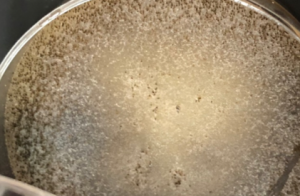Possible ID: Podospora
Classification:
Phylum Ascomycota
Class Sordariomycete
Order Sordariales
Family Lasiosphaericae
Isolation and culturing methods:
Isolated from a soil sample that was taken from the soil right outside of the ELC at Bucknell University (Lewisburg, PA). The soil sample was serially diluted by water and then plated on an agar plate. The plate was untouched for a week and then a small amount of hyphae was taken and put on a smaller agar plate to obtain a pure culture. This extraction of hyphae was done twice to reassure that it was a pure culture and was free from contamination.
Culture appearance and growth
The culture has black spots that have white hyphae growing around it. This species actually form perithecia which are 150 micrometers (largest width) x 1000 micrometers (length). These are narrow ovals and appear orange under the microscope. There are immature perithecia in the culture that do not contain spores
Spore production
Some spores are enclosed in the perithecia. However, some perithecia have been popped and the spores inside those are about 10-15 micrometers x 8-10 micrometers.
Collector: Manya Group: RM2S



On April 23, 2018, the PCR results returned and the genetics of this fungi was analyzed. NCBI Blast showed that it was in the genus Sordaria which differed from my identification of Pordospora. However, both genera are part of the order Sordaria